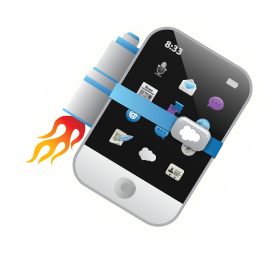Salesforce.com has a long history of providing access to cloud data on mobile devices. For over 8 years we have had a product called Salesforce Mobile` that allows administrators to configure and manage what data can be accessed by which employees on Blackberry, iOS and Android phones. You simply install the Mobile Client application that renders your data much like a standard page layout renders your data in the browser. No programming required!
Developing applications on the Force.com platform always includes the option of “point and click” or “configuration-based” development and the option of procedural development to enable full expression and “pixel level” control of your application UI. In terms of mobile applications, Salesforce Mobile represents the “point and click” approach and our Mobile SDK the procedural approach. The Mobile SDK enables the consumption of Force.com data natively from iOS using Objective-C and Android using Java as well as enabling the creation of HTML5 hybrid apps to take advantage of HTML5 development skill sets while still providing native access to device capabilities.
This week we are releasing a new set of developer tools called Mobile Packs as part of the Salesforce Platform Mobile Services launch. Mobile Packs are HTML5 libraries and samples that build on publicly available open source Javascript frameworks to provide framework native, idiomatic access to the backend services need by mobile developers. Access to our identity and authentication, database and geolocation services. Initially, we have created Mobile Packs for the AngularJS, Backbone.js and jQuery Mobile frameworks. Mobile Packs are intended for the benefit of the developer community and are open source and available on GitHub.
HTML5 as a mobile technology provides many different options to the mobile developer. Not the least of these options is where I should deploy and host my HTML5 mobile app. We have identified three choices that should cover most situations. We have included samples for each Mobile Pack that demonstrate deploying to Visualforce, deploying to Heroku using PHP or Node.js for the server language. Also in the category of coming soon will be deploying to the device directly as a vanilla phoneGap (Cordova) application.
As an early AJAX coder myself, it’s really enjoyable and rewarding to see the amazing innovation and technology in the Javascript space and especially see Javascript playing such a big part in the most important change in the application development space since the advent of the PC. I am looking forward to seeing the amazing applications that will be built with the combination of great open source frameworks and true enterprise level back end services that together enable mobile development to one of the largest community of developers.
You can get started with Mobile Packs right now and over the three days we will be providing specific articles on this blog about using each of the packs and deploying them to the various targets.
